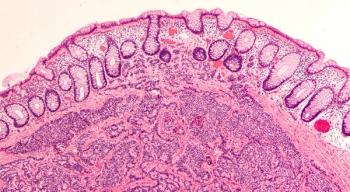
Treating patients with early-stage, resected, node-positive non–small-cell lung cancer with customized chemotherapy based on BRCA1 expression levels did not increase overall survival rates.

Your AI-Trained Oncology Knowledge Connection!


Treating patients with early-stage, resected, node-positive non–small-cell lung cancer with customized chemotherapy based on BRCA1 expression levels did not increase overall survival rates.

Quality of life was not improved with the use of early palliative care for patients recently diagnosed with malignant pleural mesothelioma, according to data presented at the World Conference on Lung Cancer.

Small-cell lung cancer patients with high tumor mutation burden treated with immunotherapy had greater objective response rate, progression-free survival, and overall survival compared with patients with medium or low tumor burden.

Selection of more aggressive treatment options for breast cancer led to substantial employment disruptions among working patients, according to the results of a recent study.

Researchers have developed a model that has prognostic value in predicting favorable or unfavorable responses to immunomodulatory derivatives in patients with multiple myeloma.

There is a high economic burden associated with the treatment of relapsed or refractory Hodgkin lymphoma. A recent study found that patients undergoing treatment for the disease incurred a median total all-cause cost of about $300,000.

Fertility preservation through sperm banking was underutilized among adolescent males newly diagnosed with cancer, according to the results of a recent observational study. Only about one-half of adolescents surveyed in the study attempted sperm banking.

Follow-up intervention by patient navigators or provider reminders may help to improve the number of patients who undergo colonoscopy after positive fecal blood test results.

Characteristics of the diabetic intrauterine environment may promote the development of acute lymphoblastic leukemia in offspring, according to the results of a new study.

A parent’s score on the electronic Psychosocial Assessment Tool following the diagnosis of cancer in a child was predictive of future levels of parental distress, according to the results of a new study.

About one in every 25 patients with chronic lymphocytic leukemia had abnormal liver function tests, and one in four developed liver dysfunction within 10 years, according to the results of a retrospective study.

A study exploring the genetic underpinnings of the newly classified high-grade neuroendocrine carcinoma has found that it is a rare but aggressive tumor with a high frequency of BRAF mutations.

The off-label use of the beta-blocker propranolol significantly reduced disease recurrence among patients with non-metastatic melanoma, according to the results of a prospective, non-randomized study.

From 1989 to 2015, breast cancer death rates decreased by 39%, according to findings from a report from the American Cancer Society. This decrease translates to well over a quarter of a million averted breast cancer deaths in the United States.

In France and other countries with low to moderate incidence of melanoma, a new study has proposed recommending genetic testing using the rule of 3-screening those with 3 or more primary melanomas or genetically related cancers-instead of the rule of 2.

Cabozantinib reduced the risk for disease progression or death by 52% compared with sunitinib in patients with previously untreated advanced renal cell carcinoma, according to updated results from the CABOSUN trial.

Use of unilateral intensity-modulated radiotherapy reduced acute toxicities and maintained oncologic outcomes compared with bilateral IMRT in patients with lateralized palatine tonsillar cancer, according to the results of a new study.

Treatment with adjuvant chemotherapy improved the overall survival of locally advanced gastroesophageal adenocarcinoma in patients treated with preoperative chemoradiotherapy and resection, according to the results of an analysis of the National Cancer Database.

Treatment with pazopanib 600 mg had no benefit over placebo for patients who had undergone nephrectomy for localized or locally advanced renal cell carcinoma.

A high rate of cancer patients reported using legalized cannabis, according to the results of a survey conducted at an NCI-designated cancer center in Washington State, which has legalized the medicinal and recreational use of cannabis.

FDG-PET/CT surveillance using a standardized reporting criteria 12 weeks after concurrent chemoradiotherapy was reliable in patients with locoregionally advanced head and neck squamous cell carcinoma, except in patients with late manifesting residual disease, according to the results of the ECLYPS study.

Updated results of the FLOT4-AIO trial confirmed the superiority of a docetaxel-based triplet regimen over the current standard of care in patients with resectable esophagogastric cancer.

Patients who reported severe distress were more likely to miss radiation therapy appointments and be hospitalized during the course of their therapy compared with patients with lower distress scores, according to the results of a study presented at the ASTRO Annual Meeting in San Diego.

Four in 10 patients with cancer being treated at an urban cancer center had depression, the majority of which was previously undiagnosed, according to the results of a study presented at the ASTRO Annual Meeting.

Undergoing SBRT prior to starting maintenance chemotherapy significantly improved progression-free survival in patients with limited metastatic non–small-cell lung cancer, according to the results of a phase II study presented at the ASTRO Annual Meeting.

People living with HIV who adhere to antiretroviral therapy but still smoke cigarettes are substantially more likely to die from lung cancer than from AIDS-related causes, according to the results of a new study.

An early-phase study of filanesib, the highly selective inhibitor of kinesin spindle protein, showed that the drug had clinical activity and manageable toxicity when combined with prophylactic filgrastim in patients with heavily pretreated multiple myeloma.

A combination of modified vaccinia Ankara-5T4 (MVA-5T4) and low-dose cyclophosphamide, or either treatment given alone, demonstrated significant survival benefit in a small group of patients with metastatic colorectal cancer compared with no treatment.

A substantially higher number of nonelderly patients with newly diagnosed cancer had insurance after implementation of the Affordable Care Act, according to the results of a new study.

Nivolumab significantly improved recurrence-free survival compared with ipilimumab in patients with stage III/IV melanoma at high risk for recurrence, according to results of the CheckMate 238 study.